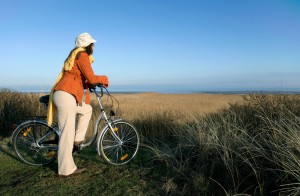 “It doesn’t get any easier, you just get faster” said Greg LeMond, the first American to win the Tour de France. In the context of cycling, his meaning is clear enough. A novice cyclist rides hard in training, and this makes him or her a faster rider. Further training, which is still hard work, is needed to become even faster. LeMond tells us this process does not stop, even at the elite level of the Tour de France rider.
“It doesn’t get any easier, you just get faster” said Greg LeMond, the first American to win the Tour de France. In the context of cycling, his meaning is clear enough. A novice cyclist rides hard in training, and this makes him or her a faster rider. Further training, which is still hard work, is needed to become even faster. LeMond tells us this process does not stop, even at the elite level of the Tour de France rider.
Though LeMond may not have meant anything more profound when he said it, to me this is an important observation about life in general. Many of us hope or even expect our lives will become easy after we complete a particular goal or pass over some specific hurdle in our path. We hope our finances will improve after our next promotion, that our relationship will improve after we are married, or that we will be able to eat what we want once we achieve our weight-loss goal.
Once we are over the hurdle, we are disappointed to find that our life is still hard; we find we have new challenges to face. Our new job requires us to work more hours, or to interact with a difficult new boss. We move in with our romantic partner and discover quirks and idiosyncrasies we hadn’t been exposed to earlier. We find we still need to watch what we eat and exercise, even after we reach our target weight. Weight-loss folk hero Jared Fogle (Jared the Subway guy), who lost 245 pounds on his diet of Subway sandwiches, thinks a failure to understand this point is main reason why so many people are able to lose weight but then fail to keep it off.
I posit there are two ways we can change the way we look at this pattern, and by doing so increase our satisfaction with our lives.
First, it’s all too easy to focus on the “hey, it didn’t get any easier” part of these changes in our lives and not even see the “I got faster” part. OK, your new boss is difficult. But are you more satisfied with what you can accomplish in your new position than the old one? Are you enjoying the raise that came with the position? OK, there are new challenges in living together, but has your relationship become closer? Don’t you get to spend more time with the person you love? OK, you still need to watch what you eat even at your target weight, but don’t you enjoy how you look and feel at your new weight?
Of course “not easier” does not always equate to “faster”. In cycling, it is possible to train hard and yet still not improve in performance. In this case, we would immediately recognize there was something wrong with the rider’s current training program, and alter it. For example, perhaps the rider is overtraining and needs more rest between workouts.
Similarly, in our lives, if something is difficult but does not have consummate benefits, perhaps we need to alter our plan. But in our lives, this may not be as easy to recognize or to accept as in the case of the cyclist. If your new job is more stressful, but no more satisfying or rewarding, perhaps it is time to look for a different one. If a relationship becomes more difficult as you become closer, perhaps you are not with the right person. If your diet is too difficult to sustain over a long time, maybe it’s time for a different weight-loss approach.
And of course there are some situations, such as regaining our health after an injury, when our life may actually become easier after clearing a particular hurdle. But I think these are actually few and far between.
[pullshow id=h1]My second point, and perhaps the more important one, is to question – [pullthis id=h1]why would we hope for our lives to be easy? Would we really be happy then?[/pullthis] For example, many of us aspire to clear our “to do” lists down to zero. We imagine if we only had a few days off to “catch up” we could do so, and that our lives would then be easier and less stressful. When a holiday weekend comes up, yet we are still unable to clear out our “to do” list, we are frustrated and dissatisfied. But this is based on a misunderstanding of the purpose of a “to do” list, and in my opinion, a less-than-ideal approach to life.
Our “to do” list should never reach empty. What would that mean if it did? What will happen to an employee or business that has no plans to make further improvements? What happens to a relationship that is neglected? What will result if we achieve a health goal, then make no further effort to improve, or even maintain, our health? An empty “to do” list would mean we would have no more goals, no more improvements to make, no more challenges to overcome, and no more accomplishments planned. It would mean the beginning of the slow death of our business, our relationships, and even of our very life itself.
[pullshow id=h2]No, just as we should not hope to have our “to do” list ever completely clear, we should neither hope for nor expect an easy life in this sense. As we accomplish a goal, we should be ready to begin another, perhaps more challenging one. As we clear a hurdle, we should pick up speed for the next one. [pullthis id=h2]In short, we should accept that life “doesn’t get any easier, but we just get faster” and enjoy the ride.[/pullthis]


